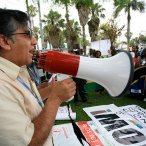
30 November 2011 | Videos | Resisting neoliberalism | Forests and biodiversity | Climate Justice and Energy | COP 17
“Apartheid Against Nature”
Interview with former Bolivian ambassador to the UN, Pablo Solon
Download: MP3 (2.9 Mb)
The lack of commitment of developed countries in reducing their polluting emissions and the pressure to kill the Kyoto Protocol to promote another weaker agreement lacking ambition, set the tone of the United Nations talks on Climate Change.
The 17th Conference of the Parties (COP) began in Durban, South Africa, with delegations from nearly 190 countries that see how time goes by as developed nations, who have a historical responsibility for causing the climate crisis, refuse to agree on serious commitments to tackle climate change.
Real World Radio interviewed social activist and former Bolivian ambassador to the UN, Pablo Solon. He assessed the resumption of the official climate talks as “complicated and difficult”. “The main issue that should be on the table, i.e. the level of emissions reduction of developed countries, is not mentioned”, he said.
Solon considered that there are matters of form in the talks that are relevant, such as the agreement of the second commitment period of the Kyoto Protocol that should enter into force in 2013. He also said it is necessary that the second commitment period excludes the market mechanisms currently included in the Protocol, which lead industrialized nations to invest in so called “clean” projects in the global South and in turn they are released from their emissions reduction obligations. Solon also believes that “the creation of a new legally binding climate deal that would enter into force only in 2020 is dangerous. The deal would be much weaker than the current UN Convention on Climate Change and of the Kyoto Protocol”.
But the Bolivian activist believes these are not the main issues. “The talks are not focusing on what would be the emissions reduction targets of developed countries”, he said. “The problem is ultimately that the United States has said it would only reduce its emissions by 3% compared with the 1990 levels, and Canada has said it would do the same. The emissions reduction targets of developed countries is very low, between 13 and 17%”. He regretted that “with that level of emissions reduction the (global average) temperature will raise by over 4°C, some say we will be in a 6° temperature increase scenario in the current century”.
Former Bolivian ambassador highlighted the pressure and conditions imposed by rich nations to reduce their emissions. The European Union, for example, conditions its emissions reductions to reaching an agreement that would end the Kyoto Protocol in 2020 and to the creation of new carbon market mechanisms, rather than preventing the temperature increase that is affecting the global climate”, said Solon.
He also referred to some positions of the Bolivarian Alliance for the Peoples of our Americas (ALBA) that demands the continuation of the Kyoto Protocol and has no unanimous position about carbon markets.
However, he underlined that social movements that participated in the World Peoples Conference on Climate Change and Mother Earth Rights in 2010, which gathered over 35,000 people in Cochabamba, Bolivia, rejected the current and future market mechanisms. They also rejected the “creation of a market mechanism linked with forests called REDD (Reducing Emissions from Forest Deforestation and Degradation), which would begin a new era of capitalism as the commodification of nature”.
About the challenges faced by climate justice movements, Solon said there are currently “three apartheids” in the world “the one of discrimination, the economic apartheid and the apartheid against nature”. Fighting against them “is the foundation of this new movement”, he said referring to the global demonstrations against the current financial system and the role of transnational corporations.
“The joining of the different movements around the world is key to send a clear message to end the current apartheid”.







